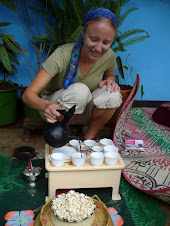This morning, KB and I walked into the countryside with my landlady, who volunteered to help us get fair prices on some food items we wanted to buy. We walked along the road leading northwest out of town until asphalt gave way to dirt. As we strolled down the dry, dusty roads, leaving town behind us, we were passed by steady streams of people making their way in the opposite direction, laden down with goods they hoped to sell in the day's market. As we met them, my landlady would ask, "Inkoolal allesh?" (Do you have eggs?), hoping to intercept some eggs on their way to the market. The question was repeated over and over to each passing individual, but none of the various bags and baskets that they or their donkeys toted seemed to carry eggs. At one point, I spotted a wire basket of eggs hanging in a small wooden store's front window and asked my landlady if we might buy them there. She insisted, though, that market eggs were cheaper – 50 santeem as opposed to 75 santeem in the store, or a difference of 0.0278 US cents. After she finished explaining that we should never buy eggs from the store because they are too expensive, she called out a warm greeting to the shopkeeper. "She is my sister," she explained. Family loyalties cannot stand in the face of the need to afford food.
Eventually my landlady's inquiries yielded a success, and we bought
We continued our walk further and further into the countryside, our surroundings growing greener and more serene with each step. It was a rejuvenating change of scenery from the garishly artificial colors and structures of Debremarkos town. I didn't realize how much I loved trees, or how starved I was to see one, until I saw a whole line of them, tall, emerald, and lush, dancing in the gentle breeze. Passing vast expenses of golden-green grassland, dotted sporadically by grazing cattle and assiduous farmers at work, we arrived finally at an Ethiopian Orthodox church secluded in a stand of evergreen trees. Gaudy decorations adorned the rooftops, round flying-saucers painted in proud Ethiopian green, yellow, and red, topped with metallic crosses and fringed with dangling tin bells that clamored in the wind. An old man entered the church compound, wearing a faded plum-colored overcoat and a neon, construction-site orange baseball cap. He solemnly approached the church's intricate doors and crossed himself repeatedly while standing on the shaded concrete porch. The printed paper icons hanging on the outside of the building stared expressionlessly back at him with their disproportionately large eyes, seemingly unmoved by his piety. We sat for some time beneath the cool shade of the evergreen trees, savoring the tranquility, before starting our journey back into town under the intensity of the late morning sun.
When we stopped back at the sister's store to pick up our eggs (which we refused to by from her), we were invited in for coffee. In honor of her unusual visitors, the sister went through all the pageantry of the full Ethiopian coffee ceremony: the scattering of grasses on the floor, the burning of incense, the hand-washing of the coffee beans and their slow roasting over the charcoal burner, the crushing of the roasted beans with persistent blows from a solid metal pestle inside a cylindrical mortar, the boiling in the gourd-shaped wooden jebena, and the drinking of the requisite three cups per person. At each step of the process, a small, tiger-striped, pointy-eared housecat interposed itself in the midst of the action. Bunkering down in each stage at exactly the point of greatest activity, it stared coolly at KB and me as if to remind us that, though the show and ceremony might be on behalf of us, the foreigners, IT was ultimately the owner of the house, the proud king of his domain, the real point of significance. I think I often see the same look in the eyes of people in Debremarkos.

No comments:
Post a Comment